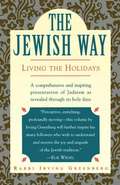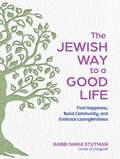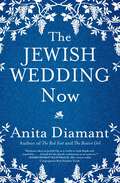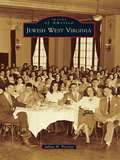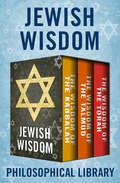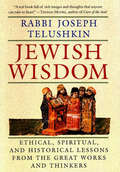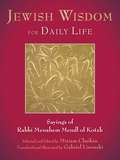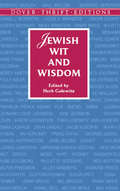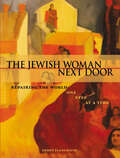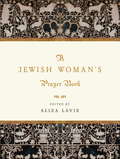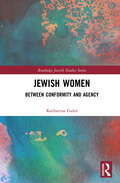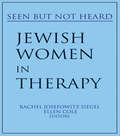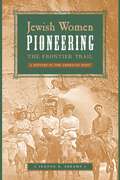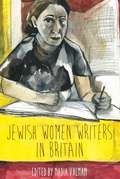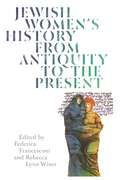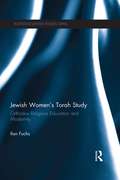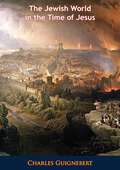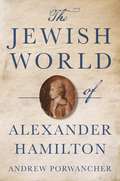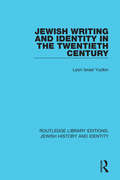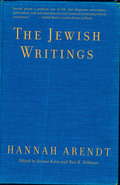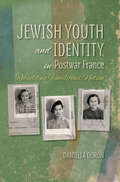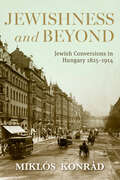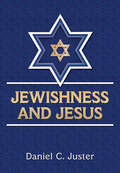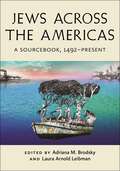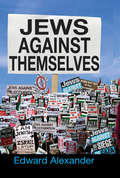- Table View
- List View
The Jewish Way: Living the Holidays
by Irving GreenbergAccording to rabbinic law, `Minyan` is a quorum of ten Jews -- the number required for a service of any kind. Rabbi Shapiro infuses this concept with new meaning as he describes a practical tenfold path, based on the eighteenth-century Hasidic tradition of the Baal Shem Tov and his followers, a path accessible not only to Jews but also to all spiritual seekers.
The Jewish Way to a Good Life: Find Happiness, Build Community, and Embrace Lovingkindness
by Rabbi Shira StutmanRest, community, and celebration are for everyone in this radical, refreshing book—where traditional Jewish wisdom becomes essential advice for today “One of the blessings of twenty-first-century globalization is that it allows us entrée into other cultures and traditions. You no longer have to be Jewish to do Jewish.”—from the introduction For as long as Judaism been a religion, “Jewish” has been a culture—one whose unique blend of ritual and realism has kept its people going for some 3,000 years. In The Jewish Way to a Good Life, Rabbi Shira Stutman invites readers of every faith—and none—to do chesed (good work), foster tzedek (justice), practice shabbat (rest), and ultimately find happiness. From Love and Sex to Mourning and Money, Rabbi Shira visits ten realms where we all get lost on occasion, to deliver spirited, sometimes surprising wisdom. On love: Sex is meant to be fun and liberating. On rest: Time is even more sacred than things. Again and again, she reveals how customs have survived not out of obligation, but because they meet our deepest needs—from shiva, which allows mourning families not to be OK, to the unbridled joy of dancing the hora at weddings. For anyone seeking community, meaning, or simply “something more,” The Jewish Way to a Good Life offers practical, time-tested ways to enrich our daily routines and engage those around us. By looking in and reaching out, we can all help tikkun olam—heal the world. #1 Bestseller in Women & Judaism
The Jewish Wedding Now
by Anita DiamantNewly revised and updated, the definitive guide to planning a Jewish wedding, written by bestselling novelist Anita Diamant—author of The Red Tent and The Boston Girl—and one of the most respected writers of guides to contemporary Jewish life.This complete, easy-to-use guide explains everything you need to know to plan your own Jewish wedding in today’s ever-changing world where the very definition of what constitutes a Jewish wedding is up for discussion. With enthusiasm and flair, Anita Diamant provides choices for every stage of a wedding—including celebrations before and after the ceremony itself—providing both traditional and contemporary options. She explains the Jewish tradition of love and marriage with references drawn from Biblical, Talmudic, and mystical texts and stories. She guides you step by step through planning the ceremony and the party that follows—from finding a rabbi and wording the invitation to organizing a processional and hiring a caterer. Samples of wedding invitations and ketubot (marriage contracts) are provided for inspiration and guidance, as well as poems that can be incorporated into the wedding ceremony or party and a variety of translations of traditional texts. “There is no such thing as a generic Jewish wedding,” writes Anita Diamant, “no matter what the rabbi tells you, no matter what the caterer tells you, no matter what your mother tells you.” Complete, authoritative, and indispensable, The Jewish Wedding Now provides personalized options—some new, some old—to create a wedding that combines spiritual meaning and joyous celebration and reflects your individual values and beliefs.
Jewish West Virginia (Images of America)
by Julian H. PreislerWest Virginia has a unique history of Jewish settlement dating back to 1849 when the first Jewish organization in the state, a Jewish burial society, was established by a small group of German Jewish immigrants in the city of Wheeling. From modest beginnings, Jews settled in towns and cities and established businesses and communal organizations. Since that time, the Jews of the Mountain State have been an integral part of the state's economic, cultural, and political life. Though always relatively small in size, West Virginia's Jewish population has been a strong advocate for the state and gained prominence in many areas. Readers will recognize images of well-known institutions such as Shoney's, Cohen's, Frankenberger's, Embee's, and others that bring back fond memories. Despite declines in Jewish population numbers, today's Jewish community remains active and involved in the life of the state.
Jewish Wisdom: The Wisdom of the Kabbalah, The Wisdom of the Talmud, and The Wisdom of the Torah (Wisdom)
by Philosophical LibraryFrom the sacred texts of Judaism: ancient and lyrical reflections on the meaning of life, faith, and humanity.The Wisdom of the Kabbalah: Handed down in the oral tradition for thousands of years and transcribed in fourteenth-century Spain, the Kabbalah is the classical expression of Jewish mysticism. This collection draws from the main work of Kabbalah—Sepher ha-Zohar, or The Book of Splendor. The Wisdom of the Talmud: Developed in the Jewish academies of Palestine and Babylonia, the Talmud is the rabbinical commentary on the Torah. From man&’s purpose and miracles, to marriage and wellness, to consciousness and community, the Talmud considers the practice of faith on a daily basis through a changing world. This approachable guide explores how interpretation of the Torah has informed Jewish life for thousands of years. The Wisdom of the Torah: In Hebrew, the word Torah means instruction, and for thousands of years, the Torah has provided instruction in Judaism, Christianity, and Islam. The inspirational selections in this collection include some of its most powerful and poetic passages, such as &“The Poems of King David,&” &“The Parables of King Solomon,&” and &“The Love Songs of King Solomon.&”
Jewish Wisdom
by Joseph TelushkinWhen, if ever, should lying be permitted? If you've damaged a person's reputation unfairly, can the damage be undone?Is a person who sells weapons responsible for how those weapons are used?if the fetus is not a life, what is it? How, as an adult, can one carry out the command to honor one's parents when they make unreasonable demands?What are the nine biblical challenges a good person must meet?What do the great Jewish writings of the last 3,500 years tell us about these and all other vital questions about our lives? Rabbi Joseph Telushkin has devoted his life to the search for answers within the teachings of Judaism. In Jewish Wisdom, Rabbi Telushkin, the author of the highly acclaimed Jewish Literacy, weaves together a tapestry of stories from the Bible and Talmud, and the insights of Jewish commentators and writers from Maimonides, Rashi, and Hillel to Einstein, Isaac Bashevis Singer, and Elie Wiesel. A richer source of crucial life lessons would be hard to imagine.Accompanying this extraordinary compilation is Teluslikins compelling commentary, which reveals how these texts continue to instruct and challenge Jewsand all people concerned with leading ethical livestoday As he discusses these texts, Rabbi Telushkin addresses issues of fundamental interest to modern readers: how to live with honesty and integrity in an often dishonest world; how to care for the sick and dying; how to teach children to respect both themselves and others, how to understand and confront such great tragedies as antisemitism. and the Holocaust; what God wants from humankind. Within Jewish Wisdom's ninety chapters the reader will find extended sections illuminating Jewish perspectives on sex, romance, and marriage, what kind of belief in God a Jew can have after the Holocaust, how to use language ethically, the conflicting views of the Bible and Talmud on the death penalty, and much, much more.Jewish Wisdom adds a new dimension to the many widely read contemporary books that retell the stones and reveal the essence of classic religious and secular literature. Possibly the most far-ranging volume of stories and quotations from Jewish texts, Jewish Wisdom will itself become a classic, a book that not only has the capacity to transform how you view the world, but one that well might change how you choose to live your life.
Jewish Wisdom for Daily Life: Sayings of Rabbi Menahem Mendl of Kotzk
by Miriam Chaikin Gabriel LisowskiRabbi Menahem Mendl was a Hassidic master renowned for his wisdom throughout Europe. The spiritual leader of the Jews in a small stetl called Kotzk in a corner of Poland, he was nevertheless so famous that he was he was referred to far and wide as the Kotzker. His wise sayings--about human nature, how to live, and the world of the spirit--were repeated and passed around, and, though he kept no records, they have been savored and preserved through the years. This beautifully produced collection gathers more than 130 of his sayings and joins them with elegant cut-paper illustrations by the rabbi's great-great-great-grandson, the illustrator Gabriel Lisowki, who has also provided an introduction about his ancestor.Jewish Wisdom for Daily Life is a treasure for spiritual seekers or anyone who enjoys life's lessons distilled into trenchant and memorable aphoristic gems. Here are a few:Everyone has something to teach, even a thief. If he fails he tries again. If he finds nothing of value, he takes what he finds.There is nothing more whole than a broken heart.Angels are God's favorite creatures. It's easy to see why. They are not jealous and they like to sing.Whoever believes in miracles is an imbecile. Whoever does not is an atheist.
Jewish Wit and Wisdom (Dover Thrift Editions: Speeches/Quotations)
by Herb Galewitz"It's no disgrace to be poor," observed Sholom Aleichem, "but it's no great honor, either." "Happiness is having a large, loving, caring, close-knit family in another city," remarked George Burns, while Marc Chagall noted that "Art is the unceasing effort to compete with the beauty of flowers and never succeeding." These and many more classic examples of Jewish wit and wisdom — sometimes hilarious, frequently profound, almost always incisive — enliven the pages of this entertaining and practical little volume.Some 500 aphorisms include observations and remarks from statesmen, writers, artist, philosophers, jurists, musicians, and celebrities — from the prophets of the Old Testament, the Talmud, and Maimonides to Joey Adams, Barbra Streisand, and Woody Allen. Here also are memorable quotes from Louis Brandeis, Martin Buber, Fanny Brice, Heinrich Heine, Sam Goldwyn, Golda Meir, Karl Marx, Groucho Marx, Herman Mankiewicz, Albert Einstein, and many others.Arranged alphabetically by author, these thought-provoking pronouncements will not only serve as a handy resource for speech writers and public speakers but will also amuse and inspire all readers.
The Jewish Woman Next Door: Repairing the World One Step at a Time
by Debby FlancbaumThe women profiled in this collection of absorbing essays—some known throughout the world, others known only within their own communities—all share one key trait: whether religious or secular, they are driven by their commitment to Judaism to engage in acts of kindness. In profiling women such as Ruth Gruber, who helped hundreds of Jewish refugees escape from war-torn Europe, or Wendy Kay, who regularly invites teenagers to her home for Shabbat, The Jewish Woman Next Door provides contemporary role models that readers will admire and be able to emulate.
A Jewish Woman's Prayer Book
by Aliza LavieA beautiful and moving one-of-a-kind collection that draws from a variety of Jewish traditions, through the ages, to commemorate every occasion and every passage in the cycle of life, including:Special prayers for the Sabbath, holidays, and important dates of the Jewish yearPrayers to mark celebratory milestones, such as bat mitzva, marriage, pregnancy, and childbirthPrayers for companionship, love, and fertilityPrayers for healing, strength, and personal growthPrayers for daily reflection and thanksgivingPrayers for comfort and understanding in times of tragedy and lossOn the eve of Yom Kippur in 2002, Aliza Lavie, a university professor, read an interview with an Israeli woman who had lost both her mother and her baby daughter in a terrorist attack. As Lavie stood in the synagogue later that evening, she searched for comfort for the bereaved woman, for a reminder that she was not alone but part of a great tradition of Jewish women who have responded to unbearable loss with strength and fortitude. Unable to find sufficient solace within the traditional prayer book and inspired by the memory of her own grandmother's steadfast knowledge and faith, Lavie began researching and compiling prayers written for and by Jewish women.A Jewish Woman's Prayer Book is the result--a beautiful and moving one-of-a-kind collection that draws from a variety of Jewish traditions, through the ages, to commemorate every occasion and every passage in the cycle of life, from the mundane to the extraordinary. This elegant, inspiring volume includes special prayers for the Sabbath and holidays and important dates of the Jewish year; prayers to mark celebratory milestones, such as bat mitzva, marriage, pregnancy, and childbirth; and prayers for comfort and understanding in times of tragedy and loss. Each prayer is presented in Hebrew and in an English translation, along with fascinating commentary on its origins and allusions. Culled from a wide range of sources, both geographically and historically, this collection testifies that women's prayers were--and continue to be--an inspired expression of personal supplication and desire.
Jewish Women: Between Conformity and Agency (Routledge Jewish Studies Series)
by Katharina GalorJewish Women: Between Conformity and Agency examines the concepts of gender and sexuality through the primary lens of visual and material culture from antiquity through to the present day. The backbone of this transhistorical and transcontextual study is the question of Jewish women’s agency in four different geographical, chronological, and methodological contexts, beginning with women’s dress codes in Roman-Byzantine Syro-Palestine, continuing with rituals of purity in medieval Ashkenaz, worship in papal Avignon and the Comtat Venaissin, and ending with marriage and divorce in Israeli film. Each of these explorations is interested in creating a dialogue between the patriarchal legacy of the traditional texts and the chronologically corresponding visual and material culture. The author challenges traditional approaches to the study of Jewish culture by employing tools from art history, archaeology, and film and media studies. In each of these different contexts, there is ample evidence that women—despite persistent overall structural discrimination—have found ways to challenge male constructs of gender norms. Ultimately, these examples from past and present times highlight women’s eminence in shaping Jewish history and culture. Bringing a new interdisciplinary lens to the study of the history of gender and sexuality, the book will be of interest to students and researchers of Jewish history and culture, art history, archaeology, and film studies.
Jewish Women in Therapy: Seen But Not Heard
by Ellen Cole Rachel J SiegelHere is the first volume ever to focus on the issues of Jewish women in the context of counseling and psychotherapy. Through poignant reflection and observation, the authors convey the richness and variety of Jewish women’s experiences and the Jewishness and femaleness of the concerns, issues, values, and attitudes that Jewish women--both clients and therapists--bring into the therapy room.Jewish Women in Therapy is a landmark book in many ways. It calls attention to the historical and political realities of the Jewish heritage and acknowledges the oppression of both Jews and women that therapists have typically ignored. And although Jewish women have participated in the therapeutic process, as clients, scholars, and therapists, seldom have they chosen to write about it.Never before have the writings of so many distinguished leaders in the field, including Melanie Kaye/Kantrowitz, Evelyn Torton Beck, and Susannah Heschel, been compiled. They examine the damaging stereotypes of Jewish women--the Jewish American Princess and the Jewish Mother--that flourish today. Chapters also address the conflicts that many women feel about being Jewish and being female, celebrate the contributions of Jewish women to feminism and to therapy, examine the deliberate omission of women from the political process and the religious ritual, and convey the complexities of the oppression that are still blatantly directed at both Jews and females.
Jewish Women Pioneering the Frontier Trail: A History in the American West
by Jeanne E. AbramsThe image of the West looms large in the American imagination. Yet the history of American Jewry and particularly of American Jewish women—has been heavily weighted toward the East. Jewish Women Pioneering the Frontier Trail rectifies this omission as the first full book to trace the history and contributions of Jewish women in the American West.In many ways, the Jewish experience in the West was distinct. Given the still-forming social landscape, beginning with the 1848 Gold Rush, Jews were able to integrate more fully into local communities than they had in the East. Jewish women in the West took advantage of the unsettled nature of the region to “open new doors” for themselves in the public sphere in ways often not yet possible elsewhere in the country. Women were crucial to the survival of early communities, and made distinct contributions not only in shaping Jewish communal life but outside the Jewish community as well. Western Jewish women's level of involvement at the vanguard of social welfare and progressive reform, commerce, politics, and higher education and the professions is striking given their relatively small numbers.This engaging work—full of stories from the memoirs and records of Jewish pioneer women—illuminates the pivotal role these women played in settling America's Western frontier.
Jewish Women Writers in Britain
by Nadia ValmanAgainst a background of enormous cultural change during the nineteenth and twentieth centuries, writing by British Jewish women grappled with shifting meanings of Jewish identity, the pressure of social norms, and questions of assimilation. Until recently, however, the distinctive experiences and perspectives of Jewish women have been absent from accounts of both British Jewish literature and women's writing in Britain. Drawing on new research in Jewish studies, postcolonial criticism, trauma theory and cultural geography, contributors in Jewish Women Writers in Britain examine the ways that these women writers interpreted the experience of living between worlds and imaginatively transformed it for a wide general readership. Editor Nadia Valman brings together contributors to consider writers whose Jewish identity was central to their practice as well as those whose relationship to their Jewish heritage was oblique, complicated, or mobile and figured in their work in varied and often unexpected ways. The chapters cover a range of genres including didactic fiction, devotional writing, modernist poetry, autobiographical fiction, the postmodern novel, memoir, and public poetry. Among the writers discussed are Grace Aguilar, Celia and Marion Moss, Katie Magnus, Lily Montagu, Amy Levy, Nina Salaman, Mina Loy, Betty Miller, Eva Figes, Ruth Fainlight, Elaine Feinstein, Anita Brookner, Julia Pascal, Diane Samuels, Jenny Diski, Linda Grant, and Sue Hubbard. Expanding the concerns of Jewish literature beyond existing male-centered narratives of the heroic conflict between family expectations and personal aspirations, women writers also produced fiction and poetry exploring the female body, maternity, sexual politics, and the transmission of memory. While some sought to appropriate traditional Jewish literary forms, others used formal and stylistic experimentation to challenge a religious establishment and social conventions that constrained women's public freedoms. The extraordinary range of responses to Jewish culture and history in the work of these writers will appeal to literary scholars and readers interested in Jewish women's history.
Jewish Women's History from Antiquity to the Present
by Rachel Adelman Natalia Aleksiun Dianne Ashton Benjamin M. Baader Judith R. Baskin Marla Brettschneider Elisheva Carlebach Dina Danon Joseph and Esther Foster Professor in Judaic Studies Sylvia Barack Fishman Book Review Editor Federica Francesconi ChaeRan Freeze Tal Ilan Debra Kaplan Book Review Editor Melissa R Klapper Sharon Koren Frances Malino Renee Levine Melammed Moshe Rosman Lilach Rosenberg-Friedman Nadia Valman Rebecca Lynn WinerJewish Women’s History from Antiquity to the Present is broad in geographical scope exploring Jewish women’s lives in what is now Eastern and Western Europe, Britain, Israel, Turkey, North Africa, and North America. Editors Federica Francesconi and Rebecca Lynn Winer focus the volume on reconstructing the experiences of ordinary women and situating those of the extraordinary and famous within the gender systems of their times and places. The twenty-one contributors analyze the history of Jewish women in the light of gender as religious, cultural, and social construct. They apply new methodologies in approaching rabbinic sources, prescriptive literature, and musar (ethics), interrogating them about female roles in the biblical and rabbinic imaginations, and in relation to women’s restrictions and quotidian actions on the ground. They explore Jewish’s women experiences of persecution, displacement, immigration, integration, and social mobility from the medieval age through the nineteenth century. And for the modern era, this volume assesses women’s spiritual developments; how they experienced changes in religious and political societies, both Jewish and non-Jewish; the history of women in the Holocaust, their struggle through persecution and deportation; women’s everyday concerns, Jewish lesbian activism, and the spiritual sphere in the contemporary era. Contributors reinterpret rabbinical responsa through new lenses and study a plethora of unpublished and previously unknown archival sources, such as community ordinances and court records, alongside autobiographies, letters, poetry, narrative prose, devotional objects, the built environment, illuminated manuscripts, and early printed books. This publication is significant within the field of Jewish studies and beyond; the essays include comparative material and have the potential to reach scholarly audiences in many related fields but are also written to be accessible to all, with the introductions in every chapter aimed at orienting the enthusiast from outside academia to each time and place.
Jewish Women's Torah Study: Orthodox Religious Education and Modernity (Routledge Jewish Studies Series)
by Ilan FuchsOne of the cornerstones of the religious Jewish experience in all its variations is Torah study, and this learning is considered a central criterion for leadership. Jewish Women’s Torah Study addresses the question of women's integration in the halachic-religious system at this pivotal intersection. The contemporary debate regarding women’s Torah study first emerged in the second half of the 19th century. As women’s status in general society changed, offering increased legal rights and opportunities for education, a debate on the need to change women’s participation in Torah study emerged. Orthodoxy was faced with the question: which parts, if any, of modernity should be integrated into Halacha? Exemplifying the entire array of Orthodox responses to modernity, this book is a valuable addition to the scholarship of Judaism in the modern era and will be of interest to students and scholars of Religion, Gender Studies and Jewish Studies.
The Jewish World in the Time of Jesus
by Charles GuignebertChristian scholar Charles Guignebert (1867—1939) lectured extensively on Christian history at the Sorbonne, and conducted a 23 year long "seminar" on the New Testament. In this extensive work, Guignebert examines the Jewish world that would form the backdrop to the emergence of the early Christians.
The Jewish World of Alexander Hamilton
by Andrew PorwancherThe untold story of the founding father’s likely Jewish birth and upbringing—and its revolutionary consequences for understanding him and the nation he fought to create In The Jewish World of Alexander Hamilton, Andrew Porwancher debunks a string of myths about the origins of this founding father to arrive at a startling conclusion: Hamilton, in all likelihood, was born and raised Jewish. For more than two centuries, his youth in the Caribbean has remained shrouded in mystery. Hamilton himself wanted it that way, and most biographers have simply assumed he had a Christian boyhood. With a detective’s persistence and a historian’s rigor, Porwancher upends that assumption and revolutionizes our understanding of an American icon.This radical reassessment of Hamilton’s religious upbringing gives us a fresh perspective on both his adult years and the country he helped forge. Although he didn’t identify as a Jew in America, Hamilton cultivated a relationship with the Jewish community that made him unique among the founders. As a lawyer, he advocated for Jewish citizens in court. As a financial visionary, he invigorated sectors of the economy that gave Jews their greatest opportunities. As an alumnus of Columbia, he made his alma mater more welcoming to Jewish people. And his efforts are all the more striking given the pernicious antisemitism of the era. In a new nation torn between democratic promises and discriminatory practices, Hamilton fought for a republic in which Jew and Gentile would stand as equals.By setting Hamilton in the context of his Jewish world for the first time, this fascinating book challenges us to rethink the life and legend of America's most enigmatic founder.
Jewish Writing and Identity in the Twentieth Century (Routledge Library Editions: Jewish History and Identity)
by Leon Israel YudkinFrom the 1880s, when systematic pogroms in Russia led to massive emigration, there have been two themes in Jewish history - persecution, culminating in the holocaust, and the corresponding search for a place in the world, which led to emigration to America, the rise of Zionism and the emergence of the State of Israel. In spite of these factors, Jews throughout the world have maintained their sense of identity and their cohesion as a people. One factor which has enabled them to do this has been the formation of an ideological vision of themselves - a sense of Jewishness - and one major way in which this ideology expresses itself is through the contributions by Jews to literature and thought. This book, originally published in 1982 by an established authority on Hebrew and Israeli literature, analyses the characteristics of the Jewish sense of identity as it appears in twentieth-century Jewish literature. It considers the work of a variety of authors who wrote in different periods and countries, and shows how their Jewish background pervades their writing. Some of the authors discussed are Franz Kafka, Osip Mandelstam, Henry Roth, Giorgio Bassani, S.Y. Agnon, Saul Bellow and Norman Mailer. This book will be particularly useful since a complete understanding of the Jews in the twentieth century can only be gained by appreciating their literary and intellectual achievements.
The Jewish Writings
by Hannah ArendtGerman philosopher Arendt (1906-75) wrote perhaps more about Jews and Jewishness than any other single topic, but her most-widely read works contain almost no direct references to Jews. Kohn and Feldman have collected 41 of her essays and excerpts from books that explicitly discuss Jews. The arrangement is chronological, to trace the changes in her perspective from Germany during the 1930s and from the US through the 1960s. Annotation ©2007 Book News, Inc. , Portland, OR (booknews. com)
Jewish Youth and Identity in Postwar France: Rebuilding Family and Nation (The Modern Jewish Experience)
by Daniella Doron“Highlights the debates surrounding family and identity as French Jewish communities slowly recovered and reestablished their place in the French nation.” —ChoiceAt the end of World War II, French Jews faced a devastating demographic reality: thousands of orphaned children, large numbers of single-parent households, and families in emotional and financial distress. Daniella Doron suggests that after years of occupation and collaboration, French Jews and non-Jews held contrary opinions about the future of the nation and the institution of the family. At the center of the disagreement was what was to become of the children. Doron traces emerging notions about the postwar family and its role in strengthening Jewish ethnicity and French republicanism in the shadow of Vichy and the Holocaust.“Doron’s book appears at a key moment. Its emphasis on children emerging from hunger, displacement and war should render it standard reading for policymakers, NGOs and others interested in shaping the destinies of today’s abandoned children.” —French History“Raises fundamental questions for the understanding of not only Jewish reconstruction in post-World War II France, but also Holocaust memory, postwar French society and culture and the history of postwar European families and children.” —French Politics, Culture and Society“Doron’s deftly argued and well researched book is an important intervention into a growing body of scholarship on the postwar decade. She convincingly documents the central role that the rehabilitation of Jewish children and the reconstruction of Jewish families played in post-war French Jewish reconstruction and underscores the importance of the decade following the war in shaping Jewish historical evolution in France.” —Maud Mandel, author of Muslims and Jews in France
Jewishness and Beyond: Jewish Conversions in Hungary 1825–1914 (Studies in Hungarian History)
by Miklós KonrádThroughout the nineteenth century, Hungary's government steadily dismantled obstacles that kept its rapidly expanding Jewish communities from enjoying the full benefits of citizenship. The state's concerted efforts to "Magyarize" Jews promoted Hungarian language, culture, and sensibilities, but did not officially require Jews to abandon their faith. Nevertheless, tens of thousands of Hungarian Jews converted to Christianity during this era, with conversion rates continuing to rise even as Judaism gained full legal equality.Jewishness and Beyond addresses the apparent contradiction between these two trends. Despite the egalitarian promises and laws of Hungary's liberal nationalist government, the administration and traditional elites as a whole maintained a persistent bias against Jews that spurred particularly high conversion rates among the community's upper echelons. While Christians never forgot converted Jews' origins and increasingly thought of them in racialized terms, they also valued and generally rewarded conversion and the symbolic gesture of baptism. Conversion was an uneven and ever-shifting process in which gender and occupation played key roles, and where the actual percentage of converts within the total Hungarian Jewish population contrasted sharply with both Christian and Jewish perceptions of its frequency and spread.Jewishness and Beyond, which can be read as an introduction to the identity dilemmas of Hungarian Jews in the age of emancipation, reveals the motivations and strategies behind the conversions of Hungarian Jews, the complex reactions within and outside of their communities, and converts' own grappling with conversion's expected and unforeseen outcomes.
Jewishness & Jesus
by Daniel Juster, Th.D.This little booklet has been one of the more used booklets presenting the Good News in a Jewish context. It has sold hundreds of thousands of copies and has had consistently good reviews. The essence is to present Yeshua (Jesus) in his Jewish context and to show how following him is consistent with being Jewish. It also presents the development of the synagogue-church split and why this has made true understanding difficult.
Jews Across the Americas: A Sourcebook, 1492–Present (Goldstein-Goren Series in American Jewish History)
by Adriana M. Brodsky and Laura Arnold LeibmanAn overview of the history of American Jewry using primary sources from Latin America, theCaribbean, Canada, and the United StatesJews Across the Americas is a groundbreaking sourcebook capturing the historical diversity and culturalbreadth of American Jews across Latin America, the Caribbean, Canada, and the United States. Featuringprimary documents as well as scholarly interpretations, Jews Across the Americas builds upon newdevelopments in Jewish Studies, engaging with transnationalism, race, sexuality, and gender, andhighlighting the lived experiences of those often left out of Jewish history.Jews Across the Americas features an impressively broad and far-reaching range of historical sources,including artifacts and objects that have not previously been featured as integral to Jewish history in theWestern hemisphere. Entries teach readers how to understand everything from wills andadvertisements to sermons, and how to interpret photographs, domestic architecture, and comics.Whether it’s a recipe from Brazil that blends Moroccan and Amazonian foodways, or a text about thefirst non-binary Jew to cross the Atlantic in the eighteenth century, each entry broadens ourunderstanding of Jewish American history.
Jews Against Themselves
by Edward AlexanderThis volume features powerful essays by Edward Alexander on the phenomenon of anti-Zionism on the part of the Jewish intelligentsia. It also analyses the explosive growth of traditional anti-Semitism, especially in Europe, among intellectuals and Muslims. Alexander notes that anti-Zionism has established a presence even in Israel, where it frequently takes the form of intellectuals sympathizing with their country's enemies and perversely apologizing for their own existence.Alexander begins with an examination of the origins of Jewish self-hatred in nineteenth-century Europe. He then explores the mindset of disaffected Jews in reacting, or failing to react, to the two events that shape modern Jewry: the Holocaust and the founding of the State of Israel.The book concludes with a focus on contemporary anti-Zionism, including three essays about the role played by Jews in the Boycott, Divestment, and Sanctions Movement to expel Israel from the family of nations. A final essay addresses the need for American Jews to decide whether they are going to judge Judaism by the standards of The New York Times or The New York Times by the standards of Judaism.
